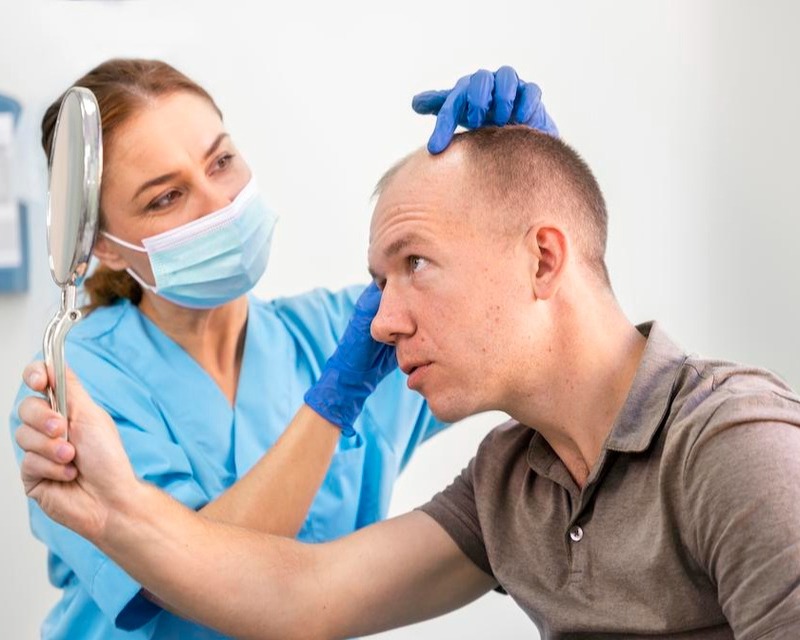A hair transplant is a surgical procedure that involves transplanting hair follicles from one part of the body, typically the scalp, to another part of the body where hair is thinning or balding. Hair transplants are a popular way to restore hair growth and improve appearance.
The hair transplant healing process can be divided into three phases:
- Immediate post-operative phase (days 1-7): During this phase, the scalp is typically red, swollen, and tender. There may also be some scabbing and bleeding. It is important to be gentle with the scalp during this time and to avoid touching it with your hands.
- Early healing phase (weeks 2-8): During this phase, the scabs will start to fall off and the scalp will begin to heal. The transplanted hair follicles will also start to shed. This is a normal part of the healing process and is known as shock loss.
- Late healing phase (months 9-12): During this phase, the transplanted hair follicles will start to grow back. The full results of the hair transplant will typically be visible within 12-18 months.
Hair transplant clinics typically offer a variety of services to their patients, including:
- Pre-operative consultation: During the pre-operative consultation, the surgeon will assess the patient's scalp and hair condition and discuss the patient's expectations for the procedure.
- Hair transplant surgery: The hair transplant surgery is performed by a qualified surgeon and a team of experienced technicians.
- Post-operative care: Hair transplant clinics provide their patients with post-operative care instructions and support. This may include follow-up appointments, medication prescriptions, and wound care advice
Factors that affect graft survival
A number of factors can affect the survival of transplanted hair follicles, including:
- The type and quality of grafts: Grafts that are harvested from the donor site using a minimally invasive technique, such as follicular unit extraction (FUE), tend to have a higher survival rate than grafts that are harvested using a traditional strip harvesting technique.
- The surgical technique used: Surgeons who have experience performing hair transplants tend to have better results than surgeons who are less experienced.
- The patient's individual physiology: Some people are simply more likely to experience graft loss than others. This may be due to factors such as age, health status, and medications that the patient is taking.
How to improve post-operative care
There are a number of things that can be done to improve post-operative care and help patients heal faster and reduce the risk of complications, including:
- Following the surgeon's instructions carefully: This includes taking any prescribed medications and avoiding certain activities, such as smoking and swimming.
- Keeping the scalp clean and moist: It is important to wash the scalp daily with a mild shampoo and conditioner. The scalp should also be kept moist by using a saline spray or ointment.
- Avoiding touching the scalp: Touching the scalp can increase the risk of infection. If you need to touch your scalp, be sure to wash your hands thoroughly first.
- Eating a healthy diet: Eating a healthy diet can help to promote healing and reduce inflammation. Be sure to eat plenty of fruits, vegetables, and whole grains.
- Getting enough rest: Getting enough rest is essential for healing. Aim for 7-8 hours of sleep per night.
New technologies to improve the hair transplant healing process
Researchers are constantly developing new technologies to improve the hair transplant healing process. Some of these technologies include:
- Bioengineered grafts: Bioengineered grafts are made from stem cells and other biological materials. They are designed to improve the survival rate of transplanted hair follicles and reduce scarring.
- Regenerative medicine approaches: Regenerative medicine approaches, such as platelet-rich plasma (PRP), can be used to promote healing and reduce inflammation after a hair transplant.
- Minimally invasive techniques: Minimally invasive techniques, such as FUE, can help to reduce the risk of complications and speed up recovery time.
The role of inflammation in the hair transplant healing process
Inflammation is a natural part of the healing process, but too much inflammation can damage transplanted hair follicles. Researchers are investigating ways to reduce inflammation and promote healing without compromising the immune system's ability to fight infection.
The role of blood flow in the hair transplant healing process
Blood flow is essential for the survival of transplanted hair follicles. Researchers are investigating ways to improve blood flow to the donor and recipient sites to help grafts heal faster.
Genetic factors that may affect the hair transplant healing process
Some people are more likely to experience complications after a hair transplant than others. This may be due to genetic factors. Researchers are investigating genetic factors that may affect the healing process and developing ways to identify patients who are at risk.
The hair transplant healing process can be complex and can vary from person to person. It is important to follow your surgeon's instructions carefully and to seek medical attention if you experience any unusual symptoms. By following the tips


